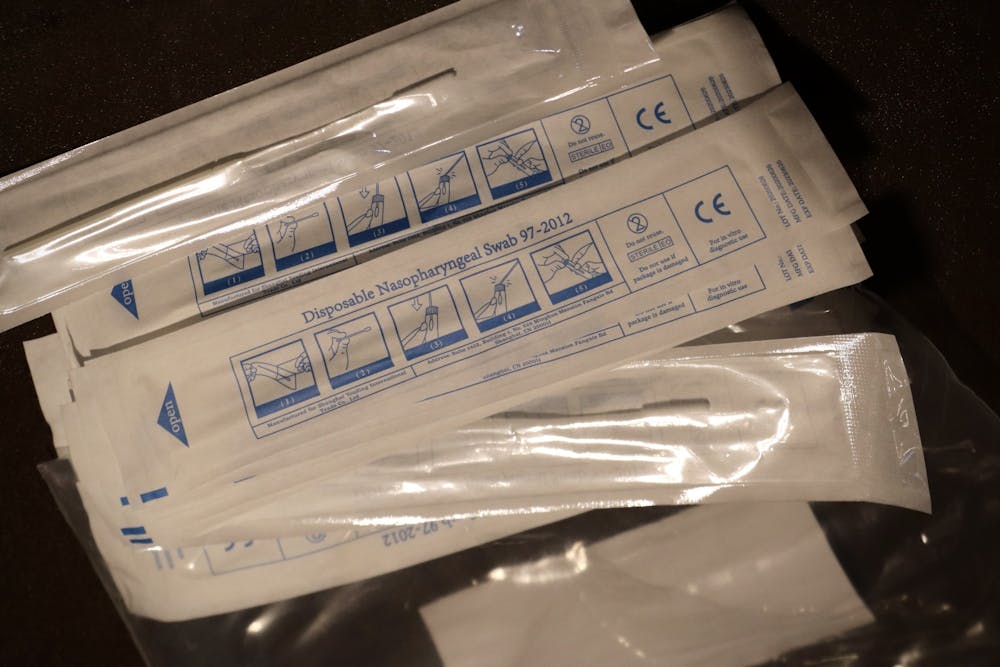
Throughout the fall semester, Penn has used nasal swabs to test for COVID-19. The University will transition to saliva-based screening starting Dec. 7.
Credit: Jonah CharltonStudents, faculty, and staff who are enrolled in Penn’s fall testing program and have not already tested positive for COVID-19 will be able to transition to the University’s new saliva-based screening test for the rest of the fall semester.
In an email sent to the Penn community Wednesday morning, Chief Wellness Officer Benoit Dubé wrote that Penn is transitioning to FDA-approved saliva-based screening on Dec. 7 in order to prepare for the spring semester when many students are expected to return to campus. Nasal swab testing will not be conducted after Dec. 5.
The saliva-based testing method will enable the University to increase its testing capacity, and will be equally as effective as the nasal swab protocols, the email reads. The permanent testing switch comes after a pilot program of the new method which, according to Dubé, was successful.
Starting Monday and lasting throughout the rest of the semester, testing will be available by appointment only, and appointments should be made on the University's COVID-19 scheduling website by 9 p.m. the night before the requested test date.
Testing for individuals with a green PennOpen Pass will occur at the Hall of Flags in Houston Hall on Dec. 7 to 18 and Dec. 21 to 22 from 8 a.m. to 4 p.m. Monday to Friday. Testing will also occur under an outdoor tent outside of Du Bois College House on High Rise Field on Dec. 14 to 18 and Dec. 21 to 22 from 10 a.m. to 4 p.m. Monday to Friday.
Irvine Auditorium is the University's dedicated testing site for those with a red PennOpen Pass, meaning individuals who are either symptomatic or may have come into contact with someone with symptoms, Dubé wrote to The Daily Pennsylvanian in an email.
Along with Houston Hall, Irvine, and the new site at Du Bois, additional testing sites will open in the spring, Dubé told the DP previously. A separate enrollment and scheduling process will be required in the beginning of the semester.
Due to the new saliva tests, community members must refrain from eating and drinking, brushing teeth and using mouthwash, chewing gum, and vaping or using tobacco products at least 30 minutes prior to arriving at the testing appointment. Additionally, members should not have any water bottles, phones, or other personal possessions out when in the testing site.
Once at the testing site, members will complete a "touchless check-in" using their PennCard, the email reads. The entire testing process, complete with check-in, is expected to take no more than 30 minutes.
Results should be available on Penn's COVID-19 results website within 48 hours, the email reads. Prior to Thanksgiving break, the University saw a surge in Penn students obtaining tests — many of whom did not schedule an appointment or sign up for weekly surveillance testing — which resulted in some delays.
Chief Operating Officer for Wellness Services Erika Gross, however, told the DP that the majority of test results were posted within 48 hours, and a message stating results could take up to 72 hours was only posted to avoid creating panic for those whose results took longer. She added that the 24- to 48-hour window is the expectation moving forward.
The email stresses that social distancing and mask usage are equally as important as enrolling in Penn's testing system.
"As always, remember to wear your mask, remain socially distant, and wash your hands frequently," the email reads. "Thank you for your partnership as we work together to keep ourselves and our surrounding communities safe."
The Daily Pennsylvanian is an independent, student-run newspaper. Please consider making a donation to support the coverage that shapes the University. Your generosity ensures a future of strong journalism at Penn.
Donate







